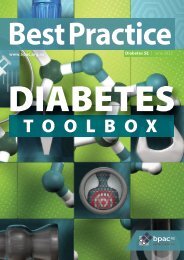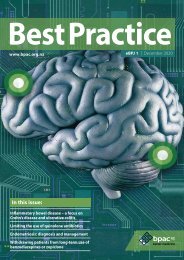You also want an ePaper? Increase the reach of your titles
YUMPU automatically turns print PDFs into web optimized ePapers that Google loves.
CHILD HEALTH MEDICINE INDICATIONS NEUROLOGY<br />
Melatonin: is it worth losing any sleep over?<br />
Modified-release melatonin is the only approved formulation of melatonin in New Zealand and it has relatively<br />
few indications. It is funded for children or adole<strong>sce</strong>nts with neurodevelopmental disorders and sleep<br />
disturbances. It is moderately effective, but not funded for improving sleep quality in adults with insomnia. Shiftworkers<br />
or people concerned about jet lag may wish to discuss the “off-label” benefits of melatonin treatment.<br />
KEY MESSAGES<br />
Melatonin is moderately effective at improving sleep quality<br />
in adults with insomnia; non-pharmacological interventions<br />
continue to be the first-line treatment and melatonin<br />
should only be considered once these have been trialled<br />
There is only one approved formulation of melatonin in<br />
New Zealand, 2 mg modified-release:<br />
– Indicated, but not funded for adults aged over 55 years<br />
with insomnia<br />
– Fully funded with Special Authority approval for children<br />
with insomnia secondary to a neurodevelopmental<br />
disorder<br />
Melatonin may be useful “off-label” for preventing or<br />
reducing jet lag and improving sleep in shift-workers or<br />
people with vision loss<br />
Melatonin must be dosed at the correct time in order to be<br />
effective<br />
There is a lack of studies on the potential adverse effects<br />
of prolonged melatonin use, particularly in children and<br />
adole<strong>sce</strong>nts<br />
Melatonin: the hormone and the medicine<br />
Melatonin regulates the circadian rhythm of sleep. It is normally<br />
released at night from the pineal gland, typically beginning<br />
14 hours after awakening, i.e. 9 pm in a person waking at 7<br />
am. 1 Ocular light at the retina suppresses melatonin release,<br />
thereby providing time-of-day information to organs and<br />
tissues throughout the body.<br />
As children enter puberty melatonin release is delayed<br />
resulting in later onset of sleepiness and later waking. 2<br />
Melatonin secretion decreases through adulthood and by age<br />
70 years nocturnal melatonin concentrations may be reduced<br />
by three-quarters. 3<br />
As well as regulating circadian rhythms, melatonin has<br />
additional physiological functions that are not completely<br />
understood.<br />
Melatonin as a medicine for insomnia<br />
Melatonin should only be considered for the treatment of<br />
insomnia once non-pharmacological interventions have<br />
www.bpac.org.nz<br />
Best Practice Journal – SCE Issue 1 23









